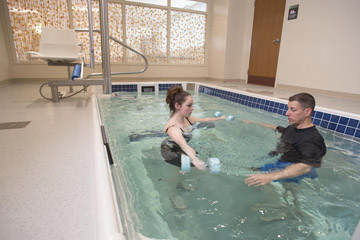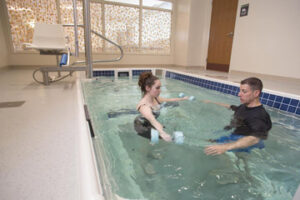

By Ann Needle
Soaring health costs are not news, but how larger hospitals help control these costs, while still offering quality care, may be a surprise to some. Rather than cutting services, health care is reaching deeper into communities and neighborhoods.
It is true that rising costs often force larger health networks and companies to close the small hospitals they acquire, but that is not the case for UMass Memorial Health Care in Worcester, explained Dr. Eric Dickson, President and Chief Executive Officer. Dickson noted, rather than closing local hospitals absorbed into its network—those in Clinton, Marlborough, and Leominster— UMass Memorial has put its expertise to work in these communities. As a result, these community hospitals have become known for their high-level, efficient emergency services, he said.
“Some of our senior emergency physicians practice at Clinton and Marlboro — many of the doctors who trained with me are there,” Dickson remarked.
According to Dickson, the bigger trend in community health care is replacing the closed-down smaller hospitals, often in the same spot, opening separate, state-of-the art health centers that take care of a range of often less-acute needs outside of the traditional, overnight hospital.
Last week, UMass Memorial opened one of these centers in Northborough, with a list of services that include urgent care (flu, earaches), primary and specialty care, along with services such as x-rays and physicals. Given this community-based care is much less expensive than having it administrated in a hospital, Dickson maintained that the centers can be a win-win.
Another cost-effective, convenient service Dickson pointed to on the horizon for many hospitals is telemedicine, putting patients in touch with a doctor online for non-life threatening services and appointments. Dickson reported UMass Memorial currently is trying this out with its employees, who seem enthusiastic so far about the results.
Nashoba Valley Seeks Local Niche
As with UMass Memorial, Ayer’s Nashoba Valley Medical Center recently opened a community health center for a variety of outpatient services in Lunenburg, reported the hospital President, Salvatore Perla. While Nashoba Valley’s 73-bed hospital has traditionally focused on serving towns west of the Nashoba Regional area, Perla stressed that it is working its way into community health services throughout the Stow, Bolton, and Lancaster.
One very visible move by Nashoba Valley and its parent company, Steward Health Care, was to take over management of a prominent family care practice in Bolton. Perla explained that when Dr. Gerald Fitzpatrick announced he was retiring his 5,000-patient practice in Bolton, “He really wanted a local doctor available for the facilities, so we took over his location.”
To put the newly-named Bolton Family Medicine and the Nashoba Valley name into the spotlight, Perla said the practice’s new doctors already have set up meet-and-greet sessions at the Bolton Senior Center and Bolton Library. The library event this month also will include a talk on a seasonal health issue. He added that, on March 8, Bolton Family Medicine will host another health talk at a pancake breakfast in Lancaster.
Even with its connections to Boston teaching hospitals, if needed, Perla emphasized that Nashoba Valley is branching into areas that will allow for more specialized treatment close to home. The hospital is working on boosting its 20-bed geriatric/psychiatric facilities to 77 beds, and is forming a comprehensive pain center. Perla said the pain center will bring in trained fellowship surgeons to perform ongoing pain management techniques such as spinal injections, which usually call on patients to travel into Boston.
Emerson Is Everywhere
Even if they have never been there, many residents have some connection to Emerson Hospital in Concord. Along with its 179-inpatient facility, Emerson has devoted itself to community health education and wellness, remarked Emerson Senior Vice President of Planning and Chief Strategy Officer Christine Gallery.
Gallery estimated that a hefty 80% of Emerson’s clients are outpatients, taking advantage of the hospital’s health centers in Westford, Groton, and Sudbury, as well as its many affiliated physician practices. “We’ve had a commitment to making care accessible and convenient to people.”
A one-of-a-kind local resource Gallery pointed to was the Emerson Wellness Center for Mind and Body. A mile from the hospital, the center is devoted specifically to health education, with Gallery calling it “one of the most robust in terms of classes and diversity of offerings.” The more than 100 classes offered for all ages include exercise for those with Parkinson’s Disease, Tai-Chi, Zumba, mindfulness training, and baby-sitting how-tos. Gallery mentioned that more than 200 Stow residents took classes there last year.
For others, simply attending a cooking class or health fair in the area is their primary contact with Emerson, with the hospital eagerly seeking out town fairs, libraries, senior centers, and schools for its education programs, she said. But a growing root of Emerson’s prominence is a bi-annual survey of local students that is increasingly viewed as the pulse on risky behavior among teenagers.
This detailed Emerson Youth Risk Behavior Survey is distributed to students in grades 6 through 12 in nine MetroWest school districts, including Nashoba Regional. The confidential survey questions students on topics such as driver safety, stress, suicidal thoughts, alcohol and drug use, sexual behavior, diet, and physical activity.
“They really use it to identify programs to develop,” Gallery remarked of the participating districts. Nashoba and other participating districts will administer the latest survey (which is voluntary) this spring.